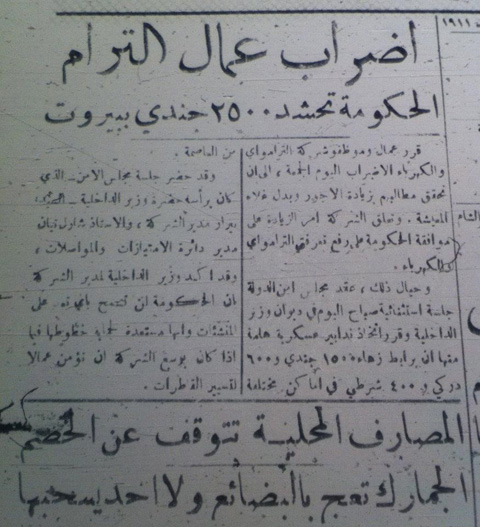![“Victims of the 'Darkening and Freezing Company’ [A pun on the electricity company’s formal name of Lighting and Tramway Company] - Suite filed demanding restoration of trampled rights - Where is the state to prove its existence?” asks a newspaper story in the Jan. 24, 1950, edition of the al-Amal newspaper.](https://www.ohio-forum.com/wp-content/uploads/2015/09/Tram-workers-strike-480.jpg)
“Victims of the ‘Darkening and Freezing Company’ [A pun on the electricity company’s formal name of Lighting and Tramway Company] – Suite filed demanding restoration of trampled rights – Where is the state to prove its existence?” asks a newspaper story in the Jan. 24, 1950, edition of the al-Amal newspaper.
The Lebanese Center for Policy Studies (LCPS) interviewed Dr. Ziad Abu-Rish, Assistant Professor of History at Ohio University, about “Electricity in Early Independence Lebanon.“
Drawing on his current book project and using source material such as newspaper articles and development reports from the 1940s and ’50s, Abu-Rish draws a picture of political, economic, and social transformation in Lebanon during the first 15 years after independence from France in 1943. The significance, he says in relation to ongoing protests in Beirut today, is that issues of ownership structure, quality of service, and consumer prices regarding public utilities have a long history of debate, struggle, and institutionalization.
Asked whether the 15-year civil war (1975-90) was to blame for obstacles to effectively developing electricity infrastructure, Abu-Rish noted that “the period, including various Israeli airstrikes, invasions, and occupations, featured the destruction (if not explicit targeting) of electricity infrastructure in Lebanon. There is also little controversy in asserting that the postwar political settlement(s) and various reconstruction efforts have failed to adequately address this destruction and its consequences for electricity production and consumption.
“This being said, it would be historically inaccurate to claim that prior to the civil war the electricity sector adequately met the needs of Lebanese citizens, or that it was free of public criticism, competing private interests, or structural deficiencies,” he continued.

“Tram workers’ strike; government deploys 2500 soldiers in Beirut,” says a Feb. 16, 1946, headline in al-Bayraq newspaper.
“So the claim that all was fine with the electricity sector prior to the civil war, or even that it was only after the major waves of rural-urban migration that the electricity sector became a contentious issue is simply not true.
“Whether it was the introduction of electricity, the uneven distribution and access to the electricity network, or the ownership, quality, and pricing of electricity, the sector was historically a subject of debate, conflict, and mobilization,” said Abu-Rish. He also noted that such dynamics fed into the debates around the Litani River Project, a hydroelectric project once promoted as a solution to the country’s electricity needs.
In response to a question about the historical debate and contemporary problems, he noted that the question of privatization vs. government ownership was central to many of the early independence discussions, and that such a question persists today.
“For me, the interesting issue is how the discourse on the lack of a state in Lebanon (i.e., wayn al-dawla) is used to buttress an already-existing neoliberal argument about the efficiency of markets. The debate about public versus private ownership also renders the consumer a passive audience and victim of the debate and its outcome. Electricity in Lebanon is a business, and it is a politically salient business. Thus it might be more productive to consider ways of mobilizing consumers—whether against the state or the private sector—to demand better pricing and services regarding electricity, and to buttress this call with collective action that threatens both where it hurts: Incumbency for the government and revenue for the businesses,” he said.



















Comments